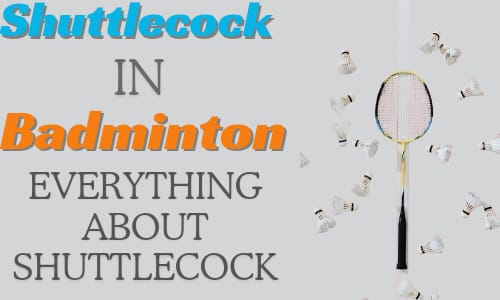Introduction
In the fast-paced game of badminton, the shuttlecock in badminton, also called a birdie, is the target of desire. Its distinct conical design, embellished with feathers or man-made substitutes, makes it stand out and attracts both players and onlookers.
So if you are a newbe and want a complete informtion about badminton you can subscribe us. If you want any information about badminton just click the link,
Come along on a journey to discover the mysteries of the shuttlecock. We will examine its complex construction, variety of varieties, and selection-influencing influences.
We will explore the differences between feather and synthetic shuttlecocks, their unique properties, and how they affect the game. We’ll also reveal crucial maintenance methods to extend the life of these delicate shuttlecocks.
What is a shuttlecock?
A shuttlecock, often referred to as a birdie or shuttle, is a high-drag weapon used in badminton. It has a conical form with a rounded cork or rubber base and 16 feathers or a synthetic substitute connected to it. The feathers are positioned in such a way that the shuttlecock is aerodynamically stable and always flies cork first.
Types of shuttlecocks
There are two main types of shuttlecocks: feather and synthetic.
Feather shuttlecocks
Feather shuttlecocks are the classic variety of shuttlecock and are used in professional competitions. They are created with the feathers of geese or ducks. This cost them more expensive than synthetic shuttlecocks. Feather shuttlecocks are more weak and have a shorter lifespan than synthetic shuttlecocks, but they are also more accurate and have a better feel.
Synthetic shuttlecocks
Synthetic shuttlecocks are composed of plastic or nylon and are more durable than feather shuttlecocks. They are also less costly and may be utilized both indoors and outside. Although synthetic shuttlecocks are not as precise as feather shuttlecocks, they are an excellent alternative for beginners and leisure players.
How to choose a shuttlecock
The type of shuttlecock you use will based on your skill level and the style of badminton you are playing.
Beginners
Beginners may might use synthetic shuttlecocks because they are more durable and less pricey.
Recreational players
Recreational players can use either feather or synthetic shuttlecocks, depending on their nature.
Professional players
Professional players must use feather shuttlecocks because they are more accurate and have a better feel.
Caring for shuttlecocks
Because shuttlecocks are weak adequate maintenance is necessary to increase their longevity.
- Keep shuttlecocks somewhere dry and cool.
- Don’t hit the shuttlecocks too hard.
- Replace shuttlecocks on a regular basis.
Conclusion
The shuttlecock is an integral aspect of the badminton game. It is a sensitive projectile that requires careful maintenance to lengthen its lifespan. Hopeful this comperhensive guide teaches you a lot. If you have any doubt let me know in the comments.
FAQs
What is the difference between a shuttlecock and a birdie? There is no difference between a shuttlecock and a birdie. Both terms are similar.
How quickly can a shuttlecock move?
Shuttlecock may move at speeds of up to 200 miles per hour.
A shuttlecock has how many feathers? A shuttlecock has 16 feathers.


3 thoughts on “A Comprehensive Guide About Shuttlecock in Badminton”